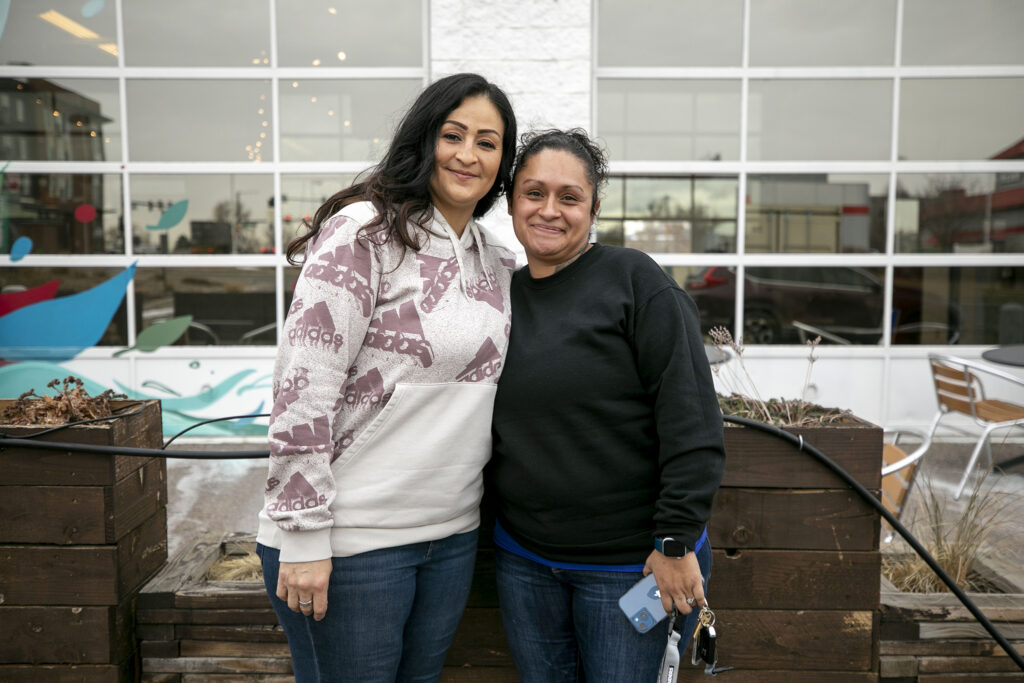“I’ve never had this want, this urge to do right and this program gets you there. It makes you want to do something with your life.”
It’s taken Hilda Gutierrez a long time to get to where she is today — a place of health, healing and on a path to bettering her life after essentially growing up in the Colorado corrections system.
She first entered at 19 years old on a slew of drug and theft felony charges. At one point Gutierrez said she assaulted an officer, hoping they would fatally retaliate. Her first stint in prison lasted 10 years. She was released and was free for another 10 years until the pandemic put a damper on everyone’s life.
“COVID hit and I kind of just slipped through the cracks and fell back into the system,” Guiterrez said. “I had a lot of time on my hands and I was just looking for money, trying to find sources of money.”
Guiterrez found herself back in prison, sentenced to five years. But this time around things are different. After serving two years, Guiterrez, now 43, is at Project: Elevate, Denver’s first city-owned and operated residential reentry program.
Elevate has taken over the former Tooley Hall halfway house in Northeast Park Hill and is operated through a collaboration with the city and The Empowerment Program, a nonprofit organization that started off assisting women reenter society and now assists with mental health and trauma response. The facility opened in August and houses about 40 women and female-identifying individuals, though capacity could reach 50-55.
Apart from being the first city-owned and -run facility, it’s also the first program to implement a partnership with a community organization as opposed to a private company.
“This partnership is a very new model that really draws on the strengths of both the city and the Empowerment Program,” said Stephanie Robertson, Project: Elevate’s Director of Operations. “It’s a unique synergy. It’s not a pilot per se but could be a step forward in figuring out what community corrections and reentry could look like moving forward.”
Robertson said Project: Elevate differs from past halfway houses in that the assistance works on an individual level. Each resident works with a care team and a peer navigator to create a specified plan that meets their individual needs.
That’s where The Empowerment Program comes in.
Through Empowerment and the outside resource-based groups they bring in, residents receive assistance with financial, educational or vocational learning. They are provided with substance-use treatment services and robust mental health services. The facility has private rooms for telehealth services and a mobile medical van comes to the site often to provide primary care.
Robertson said that approach was built on “the premise that women really do enter the criminal justice system differently than men do.”
Women’s “path” into the system is typically due to “prior experiences of abuse, mental illness, substance abuse or misuse, some real economic and social marginality,” Robertson said. With that premise, Robertson said it’s necessary to provide that tailored approach to residents.
“We recognize that we can’t be all things to all people but we can provide some really great connections,” Robertson said.
Cass Harris, Elevate’s Director of Services and Care Manager at Empowerment, agrees.
Harris added, “I think the common theme that I’ve heard over time in working with the participants is that there wasn’t a lot of connection. Empowerment’s hope is that we can connect folks so that they feel like they have other options, so they begin to restore that sense of self and create that motivation… If we can build robust connections, I think that’s where we’re going to see the change happen.”
Guiterrez said the connections and the support system have been the two key factors in her success so far in the program.
Before she was arrested and after, she noted that support was the one thing she never had.
That’s the purpose of halfway houses. They are transitional programs that are meant to assist people in reentering society. Instead of releasing folks to the outside world immediately after prison or jail time, halfway houses provide additional support through assistance services, such as job training and drug rehabilitation. But this hasn’t been the case, according to Guiterrez’s peer navigator Alicia Renteria.
Renteria previously stayed at the Arapahoe County Residential Reentry Center in Littleton where she said she didn’t receive half the help Project: Elevate offers. There were no navigators, nothing as simple as transportation assistance and any small infraction, could send you back to jail or prison.
Angie Phebus, the Facility Director at ACRC with GEO Reentry Services, said the facility offers a variety of services including mental health support, substance abuse support and its own form of peer support, similar to a Big Sister program. She added that engagement is a necessity but isn’t forced.
The goal of halfway houses is to reduce recidivism by preparing a person for success, but that isn’t happening in Colorado or Denver.
A recent ProPublica investigation that out of 100 people in a halfway house, only 35 people will finish the program and remain out of the system for at least two years. About 22 people will complete the program but be reincarcerated within two years; 26 people will fail the program on a technical violation; 14 will run away; and two will go back into the system for a new crime.
At 50%, Colorado has one of the highest three-year reincarceration rates in the U.S., according to a national 2018 study conducted by the Virginia Department of Corrections.
In 2019, we did our own analysis on halfway houses specifically in Denver and found similar results. Less than 56% of participants completed their programs from 2016 through 2018 and Tooley Hall specifically, along with the Williams Street operation in City Park West, had the lowest completion rate at 54%.
2019 was also the year Denver City Council voted to end halfway house contracts with two of the biggest for-profit organizations, CoreCivic and GEO Group, which used to operate Tooley Hall. A vote spearheaded by Councilmember Candi CdeBaca. Both groups have been shrouded in controversy and criticism for how they treat participants and their political contributions.
A majority of halfway houses in Colorado are run by for-profit organizations, which criminal justice activists believe foster poor environments for participants that ultimately lead to their failure.
Many Colorado leaders including CdeBaca, Gov. Jared Polis and Denver mayoral candidate and current State Representative Leslie Herod, have said these for-profit entities have profits as their end goal as opposed to successful reentry.
“Colorado’s community corrections model has heavily relied on the participation and provider network of the private sector,” Greg Mauro, director of Denver’s Division of Community Corrections, which handles halfway houses in the city. “In 2019, the city sort of adopted a new approach to community corrections and wanted to move away from that reliance on just the private sector and really wanted to look at our nonprofits and community-based entities that were doing some grassroot work to operate these programs.”
Thus Project:Elevate was born.
But the process wasn’t easy. Community Corrections had to quickly find a community-based provider to fill in for the private contractors and new halfway house locations. Mauro said the existing halfway house buildings are owned by the private contractors and the Denver zoning code limits where new buildings can be placed. City Council voted to purchase Tooley from GEO Group and through several rounds of proposal requests, the department found Empowerment.
Project: Elevate is brand new, so there isn’t any success rate data. But Mauro said there are plans to replicate this model with a men’s program in the future, which involves looking for a program similar to Empowerment that focuses on men.
Robertson said while that data may be important, right now the program is focusing on the residents’ experiences at the facility and beyond.
“While certainly we want to help folks successfully complete their legal supervision, we also want to see that embodiment of the mission of the Empowerment program to holistically help individuals build healthier lives from the inside out,” Robertson said. “So not only are folks going to successfully complete supervision but really that they’re able to achieve sustainable affirming lives for many years to come.”
Harris said Empowerment will continue to help residents even after they’ve left the facility, if they are interested. Guiterrez and Renteria agreed that Empowerment’s continued relationship with residents is part of the beauty of the city’s new community-provided approach. Instead of being pushed out into society with what they’ve learned, Harris said the participants will always have a place to regather and recoup.
Guiterrez said she’s set to see the parole board next month but intends to stay with Project:Elevate. She’s currently working with a second chance program that offers apprenticeships in electrical work. The program will ultimately help her get into a union and a long-term career.
In the future, Guiterrez said she’d be interested in doing some peer navigation work, like Renteria. It’s her way of giving back and showing her peers that they can succeed as well.
“I’ve never had this want, this urge to do right and this program gets you there. It makes you want to do something with your life,” Guiterrez said. “You get the feeling like hey, they care…I just want to see everyone get it because I’m getting it this time. I want to share that with whoever I can, whoever wants to listen to me.”















